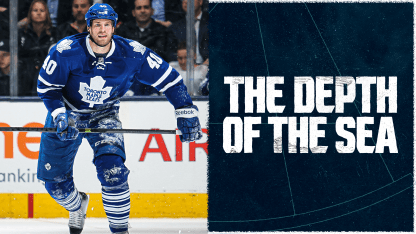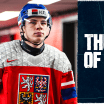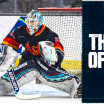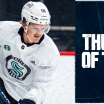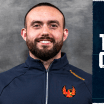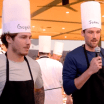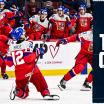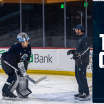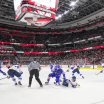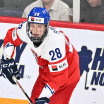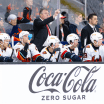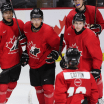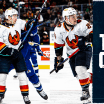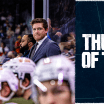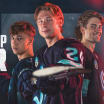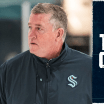PALM DESERT, CA – Over an eight-year pro hockey career, Troy Bodie played for eight different American Hockey League franchises and an ECHL squad. He appeared in 159 NHL for Anaheim, Toronto and Carolina, the latter of which he played 50 games with Kraken GM Ron Francis, serving as an associate coach as part of his self-prescribed learning the roles of Hurricanes hockey operations as he transitioned from Hall of Fame player to Carolina GM and now in the top hockey job with the Kraken.
Bodie, VP of Hockey & Business Operations for AHL affiliate Coachella Valley, is thrilled to be back on the same team as Francis. The two have a close working relationship as Bodie balances the Kraken goal of developing young players with the business upside of winning games to attract fans in a new and vibrant hockey market in the southern California desert.
“For a guy like me, you just look to pick up on everything that he does,” said Bodie in his office at the Firebirds’ two-rink training center that, of course, features the Acrisure Arena.
“He's so intelligent, and he's very gracious with his time. I love sitting beside him, watching games, and hearing all the things that he notices. Even having worked as a pro scout, I'm still learning how he watches the game and taking that into how we watch and evaluate our players.”
Bodie credits Kraken assistant GMs Jason Botterill and Alexandra Mandrycky, plus vice president and assistant general manager Ricky Olczyk, with supporting him on all sorts of administrative and organizational knowledge needed to do his job of acquiring players, managing call-ups to the Kraken and from Seattle ECHL affiliate Kansas City, building relationships with coaches of Kraken prospects still in juniors and following Kraken business procedures. He’s also deeply involved with all matters of marketing the Firebirds in the nine-city Coachella Valley and growing the sport at an organic level.
Developing Players, Fans and a Winning Culture
The Firebirds started play as the AHL’s 32nd franchise in 2022-23, a year after the Kraken’s inaugural season. That first year, which resulted in a Western Conference championship and coming within an overtime goal of winning the league’s Calder Cup on home ice, was an astounding debut. Bodie said, “We were just trying to keep our heads above water” all that season, sort of like the swan “so gracious on top and the feet kicking furiously under underneath.”
“Being on the ground in Coachella since the beginning, Troy had to wear a variety of hats [very much on the business side too in Year 1],” said Mandrycky. “His can-do attitude has been vital to the Firebirds and Kraken’s success on and off the ice.”
That can-do attitude started back in juniors days, which doubled as a first lesson in winning culture. Picked in the ninth and final round of the 2003 NHL Draft as an 18-year-old forward with Western Hockey League champion Kelowna, he played three more years for the Rockets, who won two more consecutive WHL titles and finished 2004 as Memorial Cup champion, winning the holy grail of North American juniors hockey. In the Memorial Cup title year, Bodie pitched in eight goals (plus seven more in 17 playoff games) and 12 assists during the regular season, along with 112 penalty minutes, flashing early signs as a team protector. In all, he notched two WHL seasons with 100-plus penalty minutes and five more in the pros.
“The primary goal here from a Kraken standpoint is developing young players,” said Bodie. “I'm a big believer you don't really develop players fully in a losing culture. That's where a lot of these veterans come in [mentioning captain Max McCormick and forward John Hayden by name]. "Those veterans have to carry the load offensively and help with the development of these young kids. We very much owe to our fans to win. And all of us are in this game to win hockey games, right? Teaching guys to be two-way players and learn their roles on a team is very important. But teaching guys to win is super important, and we have to do that."
Role Models and ‘Doing Things the Right Way’
Thanks to adroit team signings over the first three seasons by Francis, Bodie and the entire hockey operations group, Kraken prospects have all sorts of role models for comportment on the ice, in the training room, following nutrition plans and knowing how a pro pursues his hockey dreams in the offseason too. Winning comes with the process, as evidenced by two straight Western Conference titles and the current squad in the top tier of the conference despite multiple injuries to veteran players and roster depletion (in a good way) via players like prospect Ryan Winterton and veteran Mitchell Stephens called up to the NHL.
“You look at what [the young prospects] contribute here,” said Hall of Fame goalie Grant Fuhr, the Firebirds broadcast analyst. “Then you watch when they go up and play games in Seattle. They bring the same work ethic. They do the little things right, the hard plays around the boards, whether they take the body. They've all learned the proper way.”
To maintain a winning culture and winning atmosphere here, it's tougher to tougher while sticking to teaching and developing a larger share of young prospects on the roster,” said Bodie, who respects the coaching staff’s leadership but also makes a point to connect with most all Firebirds player every day for at least a quick check-in. “We have so many more young guys [as the first two Kraken draft classes are age-eligible to play in the AHL]. But our scouting staff has done such a good job at drafting these young kids. They come in with still a lot to learn, but they're contributing the same time with great compete levels.”
Competing On the Ice, In the Front Office
Bodie has plenty of competitive fire himself, displayed on game nights when he is in the team suite, taking copious notes and voicing his opinions about all matters so the ice. In conversation, he said he loves that he still has a team in which he is deeply invested and fuels his passion for the game of hockey.
Unlike some players, Bodie said he knew before the last professional game, suited up for the AHL Toronto Marlies, that he would retire post-game. He recognized the following season would likely prompt him to say, “I’m better than that guy” while watching some NHL telecasts, but for his wife and family, he knew it was the right decision.
The next day, I went in and had my exit meeting and just said, ‘I'm done,’ recalled Bodie. “But I asked for a scouting job that day. It was more just like, I need something to do while I figure out what the next step was. I got the job and started scouting [for Toronto]. I thought, okay, I still very much love the game. I want to be a part of it. I didn't know where it was going to take me, but I really enjoyed it.”
Bodie said scouting was the perfect first move after his playing days, now paying dividendns in his current role: “You get to see a lot of these young kids in their first years, up until they either make [get drafted or signed to a pro contract] or they don't,” said Bodie. “It brings a lot of perspective of how long it takes some prospects while others zip right up. There's always something that players can lean on to get themselves to the NHL. They have to do it so well. There can be something that they can be without and still make it. There’s no one formula.”

